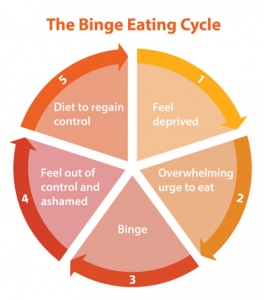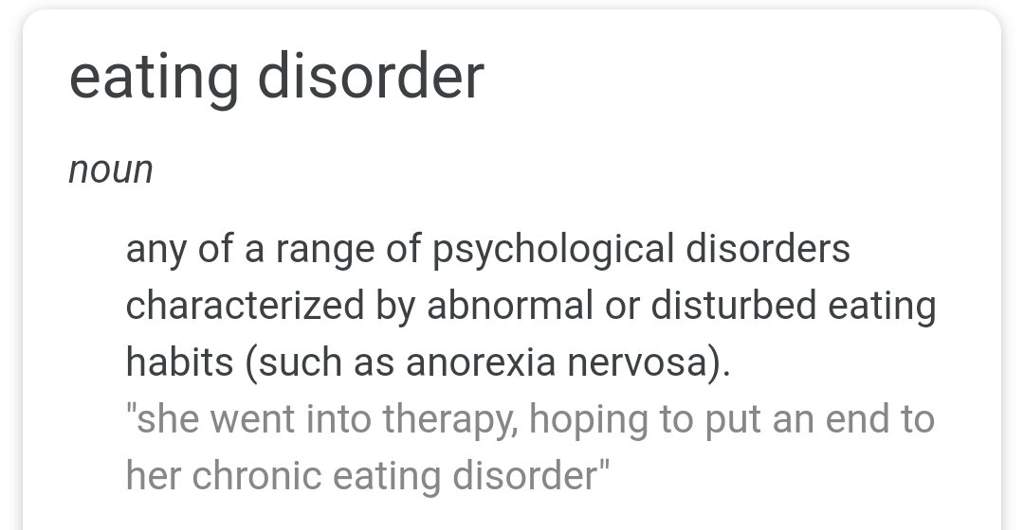They might start with an obsession with. Eating disorders are serious mental illnesses affecting people of all ages genders ethnicities and backgrounds.
 Binge Eating Disorder Helpguide Org
Binge Eating Disorder Helpguide Org
Unhealthy eating behaviours may include eating too much or too little or worrying about your weight or body shape.

Food disorder meaning. It was never about the food. Anorexia nervosa and bulimia nervosa are two of the most well known eating disorders today. An eating disorder is a mental health condition where you use the control of food to cope with feelings and other situations.
An eating disorder is when someone begins eating too much or when someone begins to avoid eating. These ritualistic behaviors may evolve as a way of establishing a sense of comfort in an unknown or stressful situation. The most common forms of eating disorders include Anorexia Nervosa Bulimia Nervosa and Binge Eating Disorder and affect.
ARFID often presents during early adolescence. Food rituals can also be part of other concerning disorders such as Obsessive Compulsive Disorder OCD. This behaviour can include limiting the amount of food eaten eating very large quantities of food at once getting rid of food eaten through unhealthy means eg.
Eating disorder definition is - any of several psychological disorders such as anorexia nervosa or bulimia characterized by serious disturbances of eating behavior. It involves medical tests on your weight blood and body mass index BMI. Misery loves company and eating disorders are no different.
Where there is an eating disorder youll may also find depression anxiety bipolar depression OCD PTSD and panic disorders the list goes on. This affects ones mental and physical health. This eating style can lead to consequences such as weight loss inadequate growth or a significant nutritional deficiency.
A person dealing with OCD may engage in repetitive behaviors such as counting number of bites cutting food into certain ways and more. An eating disorder is a medical diagnosis based on your eating patterns. Updated on November 26 2020.
Eating disorders are a diagnosed type of eating problem. People with eating disorders use disordered eating behaviour as a way to cope with difficult situations or feelings. AvoidantRestrictive Food Intake Disorder ARFID is a feeding and eating disorder characterized by limiting intake of food or food groups without a fear of weight gain.
Restricting the range of foods one eats is a common eating disorder symptom among those with restrictive eating disorders such as anorexia nervosa as well as those with overeating disorders such as bulimia nervosa 1 and binge eating disorder. Eating disorders can develop in persons living with an abusive parent. Eating disorder any in a group of disorders in which abnormal feeding habits are associated with psychological factors.
Eating Disorders describe illnesses that are characterized by irregular eating habits and severe distress or concern about body weight or shape. Youd be hard pressed to find someone with an eating disorder diagnosis alone. Characteristics may include a distorted attitude toward eating handling and hoarding food in unusual ways loss of body weight nutritional deficiencies dental erosion electrolyte imbalances and denial of extreme thinness.
An eating problem means any relationship with food that you find difficult. A state of untidiness or lack of organization. An illness of the mind or body.
Eating disturbances may include inadequate or excessive food intake which can ultimately damage an individuals well-being. Not every eating problem will be diagnosed as a disorder. Eating disorders are a range of psychological conditions that cause unhealthy eating habits to develop.


:max_bytes(150000):strip_icc()/pregnancy-and-eating-disorders-4179037-v1-31ac1bf3ba4b4604a195702316535303.png)



